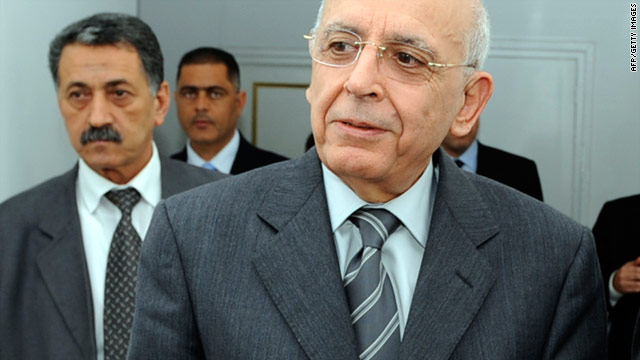Tunisian prime minister resigns amid renewed protests

- NEW: Interim president chooses new prime minister
- Mohamed Ghannouchi's resignation comes after three people were killed during protests
- Protesters were demanding that he and the parliament step down
- He said he didn't want to make a decision that would cost lives
(CNN) -- Tunisia's interim president tapped Al-Baji Qa'ed Al-Sebsi as the country's new prime minister Sunday, after the previous prime minister resigned amid protests, state-run media reported.
Former Prime Minister Mohamed Ghannouchi's resignation Sunday came a day after three people were killed during protests in the capital, Tunis.
"I am resigning today because I am not willing to be a person that takes decisions that could cause casualties," he told reporters Sunday.
He also questioned "why a lot of people considered their main target to keep attacking the government, although a lot of its members agreed to join in this critical time."
--Mohamed Ghannouchi
 Tunisia struggles to move forward
Tunisia struggles to move forward
 Fleeing unrest in Tunisia
Fleeing unrest in Tunisia
Three people were killed Saturday and nine others injured during mayhem in Tunis, according to an Interior Ministry statement cited by the state-run news agency, Tunis Afrique Presse (TAP).
More than 100 people were arrested in the area around Habib Bourguiba Avenue, in the city's center, and accused of "acts of destruction and burning," the ministry said.
Protesters had gathered in the area to demand that the interim government step down and the current parliament be disbanded. Demonstrators were also asking for suspension of the current constitution and the election of an assembly that can write a new one, as well as organize the transition to democracy.
Protests in Tunisia erupted late last year. Fed up with corruption, unemployment and escalating prices of food, people began demonstrating en masse after the self-immolation suicide of a fruit cart vendor in December. By January 13, Ben Ali -- who had ruled Tunisia since 1987 -- turned executive power over to his prime minister and fled the country.











